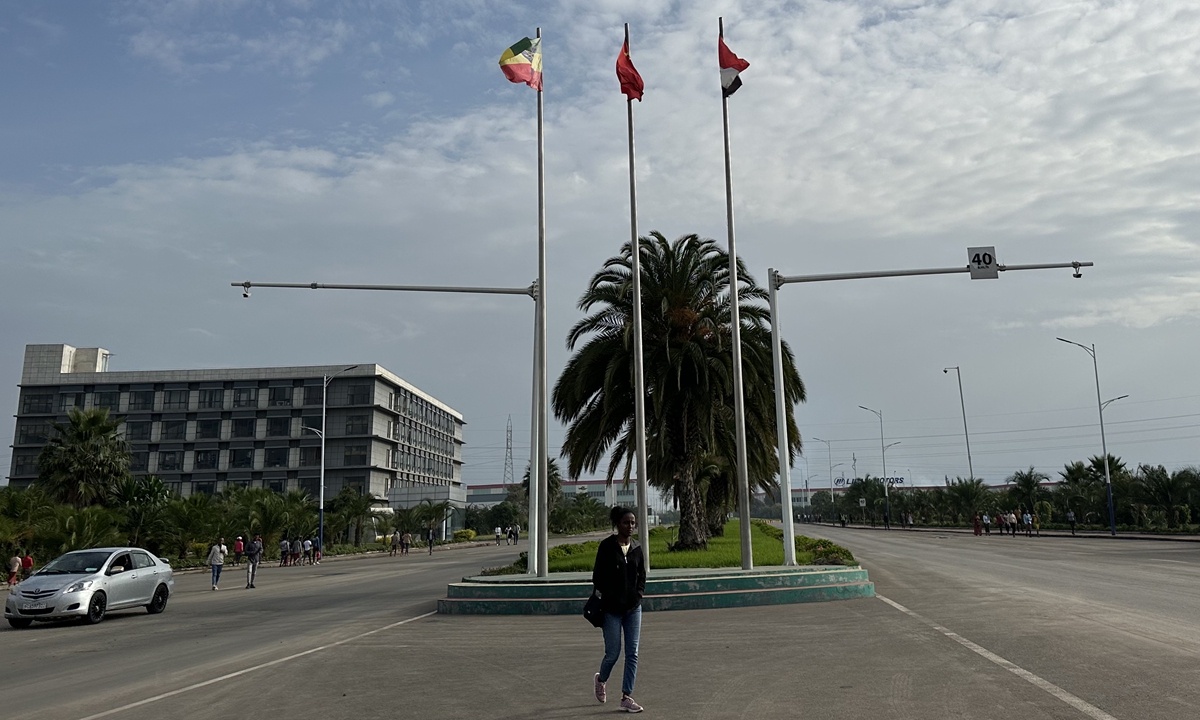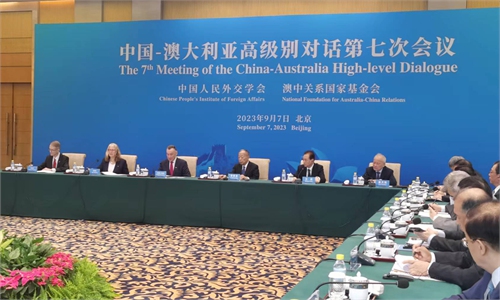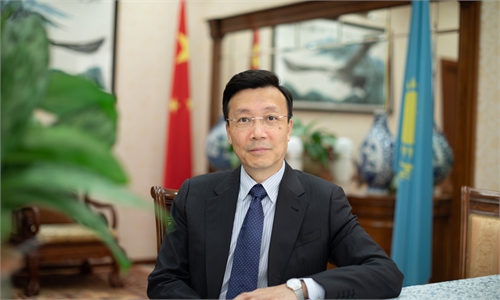
A view of Oriental Industrial Park in Addis Ababa of Ethiopia on August 2, 2023 Photo: Tu Lei/GT
It is around 6 pm in the afternoon, workers begin to flock out of an industrial park after one day's work. Outside of the gate, different colors' trucks are waiting outside for pickup. Except for armed police at the gate, it is hard to image it is an industrial park in Addis Ababa, capital city of Ethiopia.
The park, known as the Oriental Industrial Park, was co-founded by brothers from East China's Jiangsu Province, one of Chinese localities marked with the most rapid economic growth and the highest level of openness. It is the first industrial park built by a Chinese private enterprise in the country.
"We have many factories located here, spanning clothing, food, daily chemicals, and steel manufacturing," Lu Qizhong, director of the Oriental Industrial Park, told the Global Times.
Located in Duqam City with a total planned area of about five square kilometers, the park, set up in 2008, has obtained land rights use certificate of four square kilometers, including 2.33 square kilometers in the first phase and 1.67 square kilometers for its second phase.
The first phase has already been completed, with more than 140 companies operating in the park.
The park has created a total of about 26,000 jobs, among which there are about 1,300 Chinese employees. In addition, 70 to 80 percent of the locals are the female workers, Lu said.
The Oriental Industrial Park is one of the vivid examples of the Chinese investment in Africa.
China's investment in Africa has seen steady growth, and it still has vast untapped potential to grow. In the first half of this year, China added $1.82 billion in FDI to Africa, up 4.4 percent year-on-year. Chinese companies are increasingly confident in operating in the African market. More than 3,000 Chinese enterprises have invested deeply in Africa, of which over 70 percent are private companies, the mainstay of Chinese investment in African continent.
Africa is a continent of great opportunities and a promising destination for investors. Chinese investment in Africa are mutually-beneficial, meeting Africa's development needs and delivering benefits to both peoples, Wang Wenbin, spokesperson of the Foreign Ministry, said in August.
"Win-win investment cooperation between China and Africa has boosted our respective modernization. China is fostering a new development paradigm at a faster pace. Chinese businesses' investment in Africa will help forge more smooth and stable global industrial chains. While realizing their own development, Chinese companies also contribute to Africa's development strategies and actively fulfill their social responsibilities," Wang said then.
Win-win partnership
When walking at the streets of Addis Ababa, people can see that many local roads are unpaved, and most cars running on the road belong to second-hand cars. Occasionally, one can spot the wandering cattle and donkeys along the streets.
Data from World Bank showed that the Ethiopia's per capita income in 2022 was $1,020, making it a low-income country by global standards.
In the eyes of Lu, the biggest change for locals is that workers' incomes are slowly rising.
One of the most obvious examples is shoe-making. In the early years, most workers wore sandals, unable to afford covered footwear, but now, it is almost impossible to see anyone wearing slippers in the park, Lu said.
"The Chinese people's spirit of hard work has inspired us, and we work harder and gain more," said Abebe Negera, an Ethiopian employee of an aluminum company in the park.
Kemal Hamido, a local employee from another jean making company in the park echoed that his income has increased a lot as he has worked in the company for five years. He said that he is learning how to do business, and hope he can be the boss in one day.
"The Belt and Road Initiative (BRI) is to help local people and achieve common prosperity," Gu Xiaowei, general manager of Lida (Ethiopia) Textile Plc told the Global Times.
China and Africa are mutually complementary partners in the pursuit of development. China invests in broader areas and in more diverse ways in Africa. Data from Ministry of Commerce showed that China's new direct investment in Africa was $3.4 billion in 2022. As of the end of last year, China's direct investment stock in Africa had exceeded $47 billion.
Growing opportunities
Many business leaders interviewed by the Global Times said that they came to Africa to start a business in response to the BRI, and their investment and cooperation has brought jobs to local residents and expanded the overseas market of Chinese companies.
But challenges remain. Taking Ethiopia as an example, the country's import and export imbalance has led to a serious shortage of foreign exchange reserves, which means companies that rely more on international procurement may suffer from foreign exchange shortages.
In addition, how to ensure stable power supply remains an issue. The Global Times reporters encountered power outages many times during the trip to Africa. It is common for Chinese companies to bring their own power generation devices to the spot, which can deal with this problem.
When asked what kind of benefits the BRI has brought to Chinese investors, the interviewed enterprises all gave a positive answer, saying that the initiative has given Chinese investors more confidence to explore their business opportunities there.
It was difficult to attract foreign investment in the first few years after the park was established, but since the launch of the BRI, basically 7 out of 10 visiting companies are here for the long term, Lu said.
He looked forward to the second phase of the park and more overseas investment, will help attract industries with higher economic value to Ethiopia and help local industries upgrade.
With accelerated progress in the African Continental Free Trade Area, Chinese companies will find more opportunities as they explore and invest there in the African market and add new dynamism to high-quality cooperation between China and Africa, Wang from China's Foreign Ministry said.






